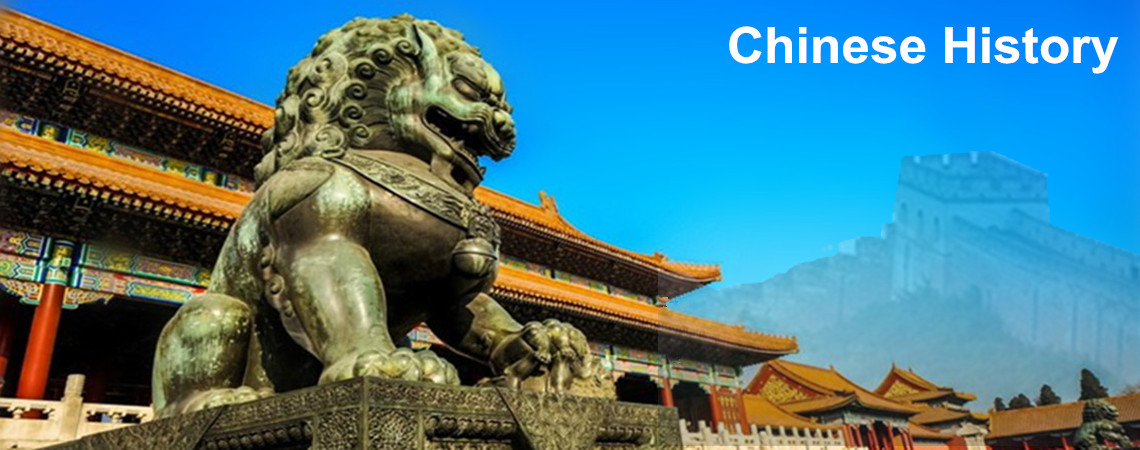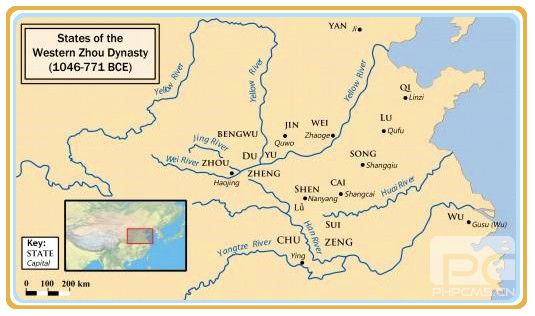
Western Zhou Dynasty( 1100BC-771BC)
As a part of Zhou Dynasty, Western Zhou was established after King Wu (1133 BC – 1116 BC) defeated the Shang Dynasty (16th – 11th century BC) and ended during the reign of King You (782 BC – 771 BC), having altogether 12 Kings and over 300 years' of history.
Facts of Western Zhou Dynasty
Time: 11th century BC to 771 BC
Capital: Haoji, in Shaanxi Province
Emperors: 12 emperors
Replaced by: Eastern Zhou Dynasty
Rise of the Western Zhou Dynasty
 Originally, Zhou was an ancient tribe living in the Loess Plateau of the central plains of China; afterwards, they moved to Zhouyuan (Qishan County of Shaanxi Province today), and then rose as a new force named 'Zhou' in the early years of the Shang Dynasty.
Originally, Zhou was an ancient tribe living in the Loess Plateau of the central plains of China; afterwards, they moved to Zhouyuan (Qishan County of Shaanxi Province today), and then rose as a new force named 'Zhou' in the early years of the Shang Dynasty.
The leader of Zhou practiced morality and justice and paid attention to developing production and expelling barbarians, which made the tribe stronger and stronger. The development of Zhou threatened King Zhou of the Shang Dynasty, so he held Chang, leader of Zhou, in captivity for seven years until the people of Zhou atoned for Chang by treasures and prisoners. Hereafter, Chang pretended to be tamed and immersed in enjoyment, but actually he paid more attention to morality and the development of production, and he was even kinder to the common people and united more vassals. Finally he owned his own domain and named himself king, that is King Wen of Zhou. After King Wen's death, King Wu inherited the position from his father and established the capital at Haojing (Changan County of Xian City in Shaanxi today) on the east bank of the Feng River, which was to become the capital of the Western Zhou Dynasty. Two years later, King Wu associated himself with many other vassals and they led their armies to crusade against King Zhou, a cruel and fatuous King of the Shang Dynasty. As a result, King Zhou was killed and the Shang Dynasty was substituted by Zhou, and because the capital, Haojing, was located in the west of China, so it was named Western Zhou.
Development of the Western Zhou Dynasty
After establishing Western Zhou, King Wu carried out the Fenfeng System in politics. The Fenfeng System is also called feudalism. Under this system King Wu divided his kingdom into separate parts and gave control of those parts to all royal members, nobles and those who had made some contributions to the country, allowing them to benefit from all the resources and incomes in their demesne. But they had to pay some tribute to the king, to obey the king's orders and be prepared to lead their knights and armies in the service of the king at any time. It's said that King Wu had 71 vassals under him, of which 40 were of the same family name as him and 15 were his brothers.
The golden age of the Western Zhou Dynasty occurred during the reign of King Wu together with Kings Cheng and Kang, who were all diligent in political affairs and kind to the people, so the society steadily developed. In the period of Kings Zhao and Mu's rule, social unrest appeared, and Western Zhou gradually declined after King Mu. Western Zhou was fighting wars all the time in the rules of Kings Gong, Yi, Xiao and Yi, and the people were exploited more and more, thus the conflicts in society became increasingly acute. It was under this serious situation that King Li, one of the noted tyrants of Chinese history, ascended the throne.
Facing the serious situation, King Li (877 BC – 841 BC) didn't take measures to pacify his people and develop production. He appointed treacherous court officials and splashed out money on one hand and continuously fought campaigns on the other. The people in Haojing couldn't bear his tyranny and finally launched a rebellion, after that King Li was banished for life. After King Li's death, King Xuan always tried to improve the environment and rectify the order of the society to reconstruct Western Zhou. But his successor, King You, was more corrupt and more luxurious and had an unlimited desire for more. In order to earn the smile of his favorite concubine Baosi, he followed one of his ministers' advice, sparing no expense to play a prank on vassal lords by lighting the beacons at Li Mountain. Baosi did gave a cold smile when seeing the soldiers of other vassal states hurry to the foot of Li Mountain sweating and out of breath, but only to find themselves deceived. King You was pleased and awarded 1,000 pieces of gold to the minister who had put forward the idea. Hence the famous Chinese saying 'a single smile costs one thousand pieces of gold'. King You played the games several more times to please Baosi. When the real danger came one day, King You had the beacon fires lit again, but no one came to his rescue because they thought he was playing a joke again. Therefore King You was killed and Western Zhou was overthrown. In 770 BC, King Ping moved the capital east to Luoyi, which heralded the beginning of the Eastern Zhou Dynasty.
Administration of Western Zhou
The king was the chief administrator and commander of the country, closely under him was the 'Shibao' or the 'Sangong' (made up of the Taishi, the Taifu and the Taibao) who were to assist him in governing the country. It was the Taizai (an equal rank with the 'Shibao') who directly assisted the king in managing political affairs. The important officials below the Taizai were the Situ (in charge of cultivation and the division of the territory, slaves and armies), the Sima (in charge of collecting taxes and managing chariots and horses), the Sikou (in charge of criminal law) and the Sikong (in charge of all kinds of industries, constructions and water conservancy). Under these chief administrators, there were many other sub-officials, who were middle and lower nobles and in charge of special affairs. Thus, a huge government system formed.
Social Economy of Western Zhou
Agriculture: a great advance in agriculture was that some sharp tools, possibly made of metals, appeared. Also, Ougeng, a new means of cultivating became popular, and was developed by two people working together cooperatively.
Handicraft Industry: the royal and vassal families both owned all kinds of handicraft workshops with numerous craftsmen. Like with the production of bronze, potting and the textile industry were both improved greatly; additionally, Barter was initially formed.
Culture: Oracle Script and bronze inscriptions come down from the Western Zhou Dynasty and are an important part of writings on ancient bronze objects. For example, a cooking vessel from the Western Zhou era discovered recently and named 'Maogongding' was engraved with 500 characters, recording the history of the politics, economy and other fields of Western Zhou.







 Ask Questions ?
Ask Questions ?